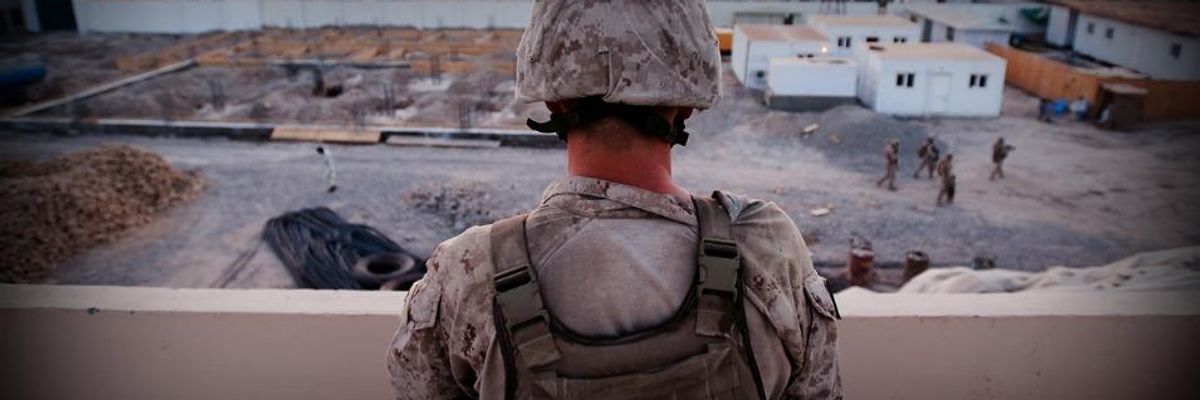"The only good Talib is a dead Talib."
These words, uttered half a decade ago by the head of intelligence for the NATO coalition force in Afghanistan, summon a far earlier American savagery. As the American empire affects to close the door on its war with Afghanistan, the words also serve as a sort of doorstop propping open our further intervention in this broken country.
The war isn't really ending. Some 18,000 foreign troops will stay in Afghanistan, almost 11,000 of them American, under a new mission called "Resolute Support." U.S. forces will also have "a limited combat role as part of a separate counterterrorism mission," according to the Wall Street Journal. Incredibly, we're not letting go. We're just disappearing the combat mission into global background noise.
We're continuing to dehumanize part of humanity on the pretext of saving it. The updated version of "the only good Indian is a dead Indian," redirected to the Taliban, was quoted a few days ago in a Der Spiegel article called "Obama's Lists: A Dubious History of Targeted Killings in Afghanistan." The article goes into detail about the administration's infamous "kill lists" and the hunting of upper- and mid-level Taliban leaders via helicopter and drone -- assassination by Hellfire missile -- which is an extermination methodology guaranteed to kill lots of innocent civilians along with (or instead of) the targeted Taliban operative. But, you know, that's war.
The official "end" to the Afghan war, while it doesn't mean the end of combat operations, does offer us a moment of disturbing reflection on what has been accomplished these last 13 years, during the first of our wars allegedly to eradicate, but in fact to promote, terror. We poured at least a trillion dollars into the war, which claimed some 30,000 lives, over two-thirds of them civilians. The first thing that occurs to me is that, officially, these statistics mean nothing.
U.S. Army General John Campbell, commander of the International Security Assistance Force, exemplified this by smothering the human toll of the war in simple-minded verbiage during a secret ceremony held last weekend in a gymnasium at ISAF headquarters in Kabul: "Our new resolute mission means we will continue to invest in Afghanistan's future," he said. "Our commitment to Afghanistan endures."
By the way, the ceremony, commemorating the war's shutdown, was secret because authorities feared the possibility of a Taliban attack. The United States and NATO, as everyone knows, are the losers, despite the bloated enormity of their military superiority. The Afghanistan war, like the Iraq war, was an utter failure even in terms of U.S. interests and geopolitical objectives.
But any honest reflection requires a far more serious, all-encompassing look at the war's results.
War is torture on a national scale. The nation of Afghanistan and its people are, of course, the primary losers in our "investment" in their future -- our investment in nation-wrecking.
For instance: "What has happened in Afghanistan over the last 13 years has been the flourishing of a narco-state that is really without any parallel in history," Matthieu Aikins said during a recent interview on Democracy Now.
Aikens' article, "Afghanistan: The Making of a Narco State," which ran recently in Rolling Stone, points out that, since the U.S. invasion, opium production in Afghanistan has doubled and the country now accounts for about 90 percent of the world's heroin traffic. Opium is about 15 percent of the country's gross domestic product, Aikens said -- even though Afghanistan is at the bottom of the drug trade economically. "Afghan farmers only touch 1 percent of the value of the global opium trade," he said.
Before 2001, opium production had been declining in Afghanistan, but, Aikens told Democracy Now, "the U.S., in its quest for vengeance against the Taliban and al-Qaeda, partnered with the very warlords whose criminality and human rights abuses had created the conditions that led to the rise of the Taliban in the first place. And in many cases, these are the same individuals who were responsible for bringing large-scale opium cultivation to Afghanistan during the war against the Soviets."
War is also humanity's spiritual cancer.
Up and down the ranks, dehumanization of the enemy rules. "The only good Talib is a dead Talib." This is the thinking that justifies mass bombing raids and kill lists. It also infects the souls of rank-and-file soldiers, such as the "Kill Team" described by Mark Boal in another extraordinary Rolling Stone story, this one published in March 2011.
"Among the men of Bravo Company," Boal writes, "the notion of killing an Afghan civilian had been the subject of countless conversations, during lunchtime chats and late-night bull sessions. For weeks, they had weighed the ethics of bagging 'savages' and debated the probability of getting caught. Some of them agonized over the idea; others were gung-ho from the start. But not long after the New Year, as winter descended on the arid plains of Kandahar Province, they agreed to stop talking and actually pull the trigger."
Boal's article details the killing -- and dismemberment -- of Afghan civilians purely for sport and revenge. The details are gruesome: "Then, using a pair of razor-sharp medic's shears, he reportedly sliced off the dead boy's pinky finger and gave it to Holmes, as a trophy for killing his first Afghan."
What a mockery the reality of war makes of the rhetoric that blesses it. The American empire holds a secret ceremony to skulk away from a failed mission. But this war isn't over. It won't be over until we vow, as a nation, not to start the next one.
